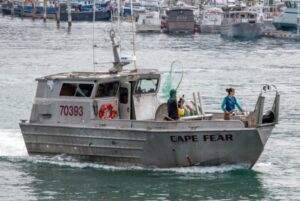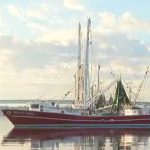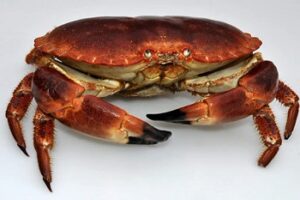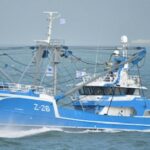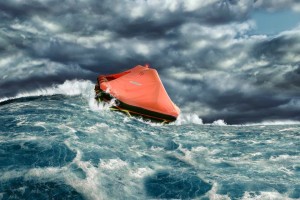Tag Archives: Gulf of Maine Research Institute
Warming waters a major factor in the collapse of New England cod, study finds
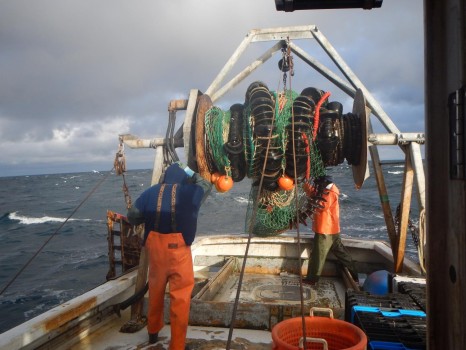 Pershing and colleagues from GMRI, the University of Maine, Stony Brook University, the Bigelow Laboratory for Ocean Sciences, and NOAA’s Earth System Research Laboratory, including the Cooperative Institute for Research in Environmental Sciences at the University of Colorado Boulder, found that increasing water temperatures reduce the number of new cod produced by spawning females. Their study also suggests that warming waters led to fewer young fish surviving to adulthood. Read the rest here 18:04
Pershing and colleagues from GMRI, the University of Maine, Stony Brook University, the Bigelow Laboratory for Ocean Sciences, and NOAA’s Earth System Research Laboratory, including the Cooperative Institute for Research in Environmental Sciences at the University of Colorado Boulder, found that increasing water temperatures reduce the number of new cod produced by spawning females. Their study also suggests that warming waters led to fewer young fish surviving to adulthood. Read the rest here 18:04
SMAST researchers employ new methods of fish geolocation
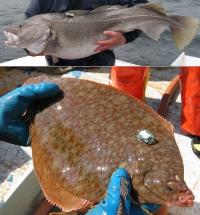 Dr. Geoffrey Cowles and his research assistants, graduate students Doug Zemeckis and Chang Liu, are partners in a multi-institution effort to tag yellowtail flounder, monkfish, and now cod to learn much more than past methods could tell them. Cod are of paramount concern in recent years because NOAA surveys have concluded that they have virtually vanished in the Northeast fishery. Zemeckis said that one of the preliminary findings is that the cod that are there are not migrating north as many believe, but are staying put. Tagged fish are not showing up in Canada, he said. Read the rest here 08:31
Dr. Geoffrey Cowles and his research assistants, graduate students Doug Zemeckis and Chang Liu, are partners in a multi-institution effort to tag yellowtail flounder, monkfish, and now cod to learn much more than past methods could tell them. Cod are of paramount concern in recent years because NOAA surveys have concluded that they have virtually vanished in the Northeast fishery. Zemeckis said that one of the preliminary findings is that the cod that are there are not migrating north as many believe, but are staying put. Tagged fish are not showing up in Canada, he said. Read the rest here 08:31
Waters Warm, and Cod Catch Ebbs in Maine
 In the vast gulf that arcs from Massachusetts’s shores to Canada’s Bay of Fundy, cod was once king.,,“A fisherman’s job isn’t to get an unbiased estimate of abundance. It’s to catch fish,” said Michael Fogarty, the chief of the ecosystem assessment program at the Northeast Fisheries Science Center of the National Oceanic and Atmospheric Administration, the federal agency that monitors sea life. “The world they see is a different world than we see in the surveys.”. Read the rest here 09:48
In the vast gulf that arcs from Massachusetts’s shores to Canada’s Bay of Fundy, cod was once king.,,“A fisherman’s job isn’t to get an unbiased estimate of abundance. It’s to catch fish,” said Michael Fogarty, the chief of the ecosystem assessment program at the Northeast Fisheries Science Center of the National Oceanic and Atmospheric Administration, the federal agency that monitors sea life. “The world they see is a different world than we see in the surveys.”. Read the rest here 09:48
Maine Voices: Rebuild cod stock with low quotas and protection of older, larger females
 Today, despite a wealth of survey data, a sophisticated process to estimate the number of fish and determine catch levels and a fishery that now operates well within these limits, we find ourselves with a cod stock that remains drastically overfished and unresponsive to our best rebuilding efforts. Read the rest here 11:50
Today, despite a wealth of survey data, a sophisticated process to estimate the number of fish and determine catch levels and a fishery that now operates well within these limits, we find ourselves with a cod stock that remains drastically overfished and unresponsive to our best rebuilding efforts. Read the rest here 11:50
Gulf of Maine: ‘Poster child’ for global warming
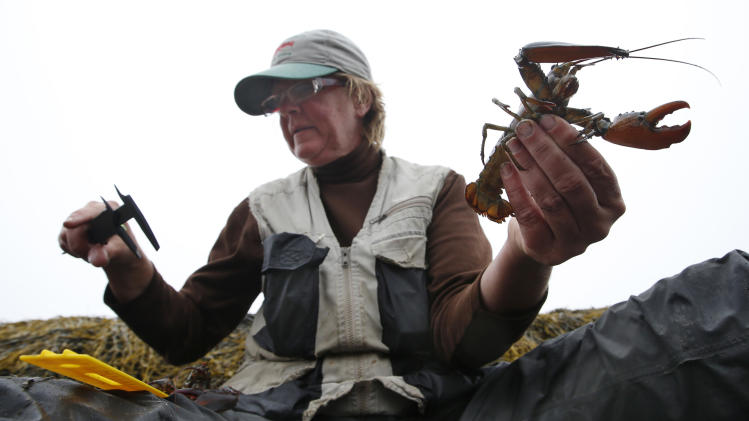 Long-established species of commercial fish, like cod, herring and northern shrimp, are departing for colder waters. Black sea bass, blue crabs and new species of squid — all highly unusual for the Gulf — are turning up in fishermen’s nets. The Gulf of Maine’s warming reflects,, Lots of info that appears to be new.BH Read the rest here 07:54
Long-established species of commercial fish, like cod, herring and northern shrimp, are departing for colder waters. Black sea bass, blue crabs and new species of squid — all highly unusual for the Gulf — are turning up in fishermen’s nets. The Gulf of Maine’s warming reflects,, Lots of info that appears to be new.BH Read the rest here 07:54
Project to forecast Maine lobster season seeking NASA funding
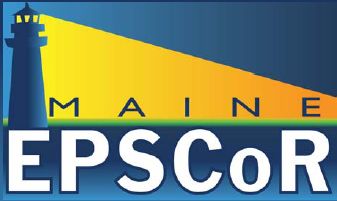 A research proposal from the Gulf of Maine Research Institute and the Bigelow Laboratory for Ocean Sciences aims to use Earth-system data to predict the movements of species along the Maine coast. Read more here kennebecjournal 16:16
A research proposal from the Gulf of Maine Research Institute and the Bigelow Laboratory for Ocean Sciences aims to use Earth-system data to predict the movements of species along the Maine coast. Read more here kennebecjournal 16:16
A Report from The Gulf of Maine Research Institute “The Future of Cod in the Gulf of Maine”
“The Future of Cod in the Gulf of Maine” explores the range of biological, climatological, economic and fishery management factors that affect this species. the report
(a footnote, nothing is mentioned about predator prey relationships regarding cod)
Support Available to Help Fishermen Interested in Investing in More Environmentally-Friendly Technologies
Opportunity for fishermen to u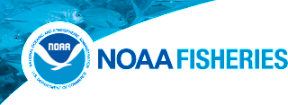 pgrade to semi-pelagic doors which are expected to help reduce fuel consumption, and reduce the physical impact of trawl systems on the sea bed. Opportunities also exist for support and equipment for vessels to transition to electronic reporting, in which vessel trip report data can be submitted electronically rather than via paper. Details here
pgrade to semi-pelagic doors which are expected to help reduce fuel consumption, and reduce the physical impact of trawl systems on the sea bed. Opportunities also exist for support and equipment for vessels to transition to electronic reporting, in which vessel trip report data can be submitted electronically rather than via paper. Details here
Networks of Researchers and Fishermen Working Together to Reduce Bycatch, Maximize Fishing Opportunities, and Advance Real-Time Technology
In the fall of 2010, the NOAA Fisheries Northeast Cooperative Research Program (NCRP) awarded more than $3 million to network groups designed to tackle difficult challenges in New England and Mid-Atlantic fisheries. These network projects provide a cross-discipline platform for fishermen, scientists, gear manufacturers and managers to work together to address their most pressing issues. continue




































